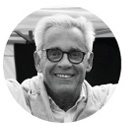The past few years have been turbulent for many industries. For those that rely on international logistics, business has been especially challenging.
Thierry Bergerault is a senior advisor and former CEO for Rose Group, a significant producer of timber for housing, farm buildings and wood products for indoor and outdoor spaces. With over three decades of experience in large wood-related industries, he says the only way to deal with unpredictable times is to build working business relationships based on trust.
“There are still signs of unpredictability in the global market. However, we have seen how well-built partnerships with long-term suppliers can help companies manage and control the situation,” he says.
Over two decades of collaboration with Metsä Fibre
Metsä Fibre provides Rose Group with sawn timber from Finnish forests. The collaboration has been continuing for over two decades and works on many levels.
The quality of Metsä Fibre’s sawn timber is high, the sawmills are new, and the sorting of the sawn timber is excellent, says Bergerault.
“We expect the material we work with to be of excellent quality. But the quality of the process is just as important because we have strict specifications. We need the right sizes, the right lengths and everything on time. Metsä Fibre has always managed to deliver according to our requests.”
It runs in the family
The Rose Group is a family-owned and operated company, founded in 1949 by Lucien Rose. Today his son Michel Rose is in charge. Initially the company specialised in agricultural sheds for animals, especially pigs, but more value-added products have since been added to the portfolio.
From the mid-2000s, the company has invested heavily in new production and planning lines for painted and treated products. A total of 390,000 cubic metres of wood go through the machines of Rose Group every year. The company works with a quick inventory turnaround, which means that the supply chain must be reliable at all times.
“Being a family-owned company does make us more reactive. We are close to our employees, and we are close to our customers. We keep the promises we make. This corporate culture also affects the requirements we have for our partners,” Bergerault says.
Rose Group has three subsidiaries, Protac and Norsilk in France and Puidukoda in Estonia. All the companies gain synergy by sourcing wood together.
Protac was created in 1995 to specialise in quality wood for inside and outside purposes. At 2013 Rose Group acquired Puidukoda, which produces and sells treated timber panels for housing and outdoor spaces. Norsilk, producing wood products from Nordic wood, was acquired from a German private equity company in late 2021. Norsilk was owned by Metsä Group until 2015, so the transaction brought even deeper collaboration between Rose Group and Metsä.
“Our goal for the years ahead is to grow together on a foundation of quality. We want to become the point of reference in our different markets.”
Sustainability is essential for Rose Group and they do not use non-certified wood.
Sustainability comes naturally
Sustainability as a concept has increased in weight during the past decade. As Bergerault puts it, any company using a natural product as a resource can be under close scrutiny. For Rose Group, sustainability is essential.
“Sustainability is a very important aspect. We are not able to use non-certified wood, for example. Obviously, when dealing with a large supplier from Finland, Metsä Fibre, all the sustainability certifications and requirements are met.”
End users and private customers seldom ask about forest certifications, Bergerault says. Instead, the overall carbon dioxide impact of the company is a matter that all companies need to address. Like other EU countries, France is committed to reducing its impact on climate change, and there is pressure on companies to publish their carbon footprint.
As an example, Rose Group is using shipping instead of road transport to import sawn timber from Finland to minimise the impact of logistics on the environment. Electric forklifts are used at worksites.
“When it comes to wood products, it is important to show that the carbon dioxide impact of our business is low. We like working with suppliers like Metsä Fibre, because we can prove that the sawn timber we use comes from sustainably managed forests and within a reasonable distance.”
What does the future hold for the wood product business?
“The past two years have been good for us. Because of climate change, there is political pressure to increase wood construction, which increases demand. And because of lockdowns during the pandemic, we also saw a boom in the Do It Yourself (DIY) market. We are optimistic about the future,” Bergerault says.
This article was originally published in Timber Magazine issue 2022-2023.

